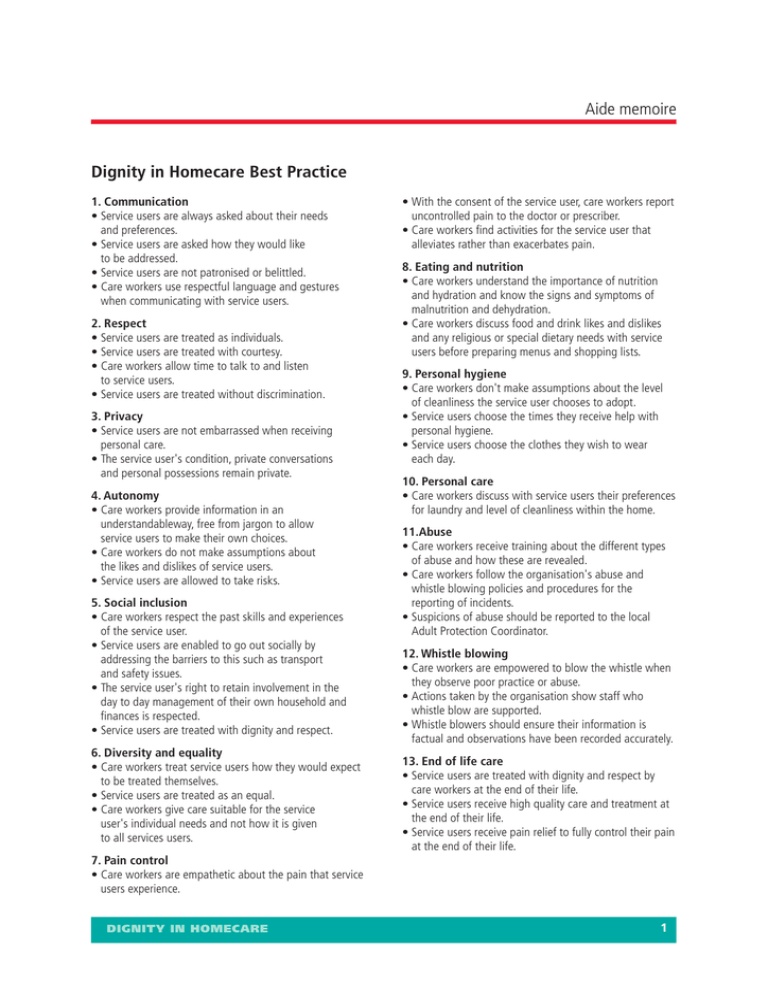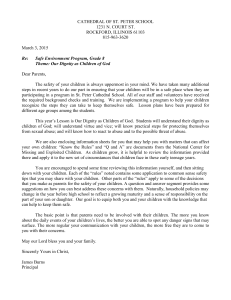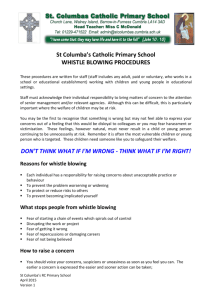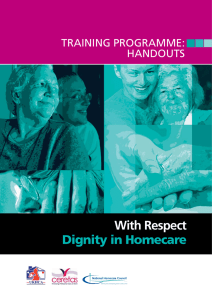Aide memoire
advertisement

Aide memoire Dignity in Homecare Best Practice 1. Communication • Service users are always asked about their needs and preferences. • Service users are asked how they would like to be addressed. • Service users are not patronised or belittled. • Care workers use respectful language and gestures when communicating with service users. 2. Respect • Service users are treated as individuals. • Service users are treated with courtesy. • Care workers allow time to talk to and listen to service users. • Service users are treated without discrimination. 3. Privacy • Service users are not embarrassed when receiving personal care. • The service user's condition, private conversations and personal possessions remain private. 4. Autonomy • Care workers provide information in an understandableway, free from jargon to allow service users to make their own choices. • Care workers do not make assumptions about the likes and dislikes of service users. • Service users are allowed to take risks. 5. Social inclusion • Care workers respect the past skills and experiences of the service user. • Service users are enabled to go out socially by addressing the barriers to this such as transport and safety issues. • The service user's right to retain involvement in the day to day management of their own household and finances is respected. • Service users are treated with dignity and respect. 6. Diversity and equality • Care workers treat service users how they would expect to be treated themselves. • Service users are treated as an equal. • Care workers give care suitable for the service user's individual needs and not how it is given to all services users. • With the consent of the service user, care workers report uncontrolled pain to the doctor or prescriber. • Care workers find activities for the service user that alleviates rather than exacerbates pain. 8. Eating and nutrition • Care workers understand the importance of nutrition and hydration and know the signs and symptoms of malnutrition and dehydration. • Care workers discuss food and drink likes and dislikes and any religious or special dietary needs with service users before preparing menus and shopping lists. 9. Personal hygiene • Care workers don't make assumptions about the level of cleanliness the service user chooses to adopt. • Service users choose the times they receive help with personal hygiene. • Service users choose the clothes they wish to wear each day. 10. Personal care • Care workers discuss with service users their preferences for laundry and level of cleanliness within the home. 11.Abuse • Care workers receive training about the different types of abuse and how these are revealed. • Care workers follow the organisation's abuse and whistle blowing policies and procedures for the reporting of incidents. • Suspicions of abuse should be reported to the local Adult Protection Coordinator. 12. Whistle blowing • Care workers are empowered to blow the whistle when they observe poor practice or abuse. • Actions taken by the organisation show staff who whistle blow are supported. • Whistle blowers should ensure their information is factual and observations have been recorded accurately. 13. End of life care • Service users are treated with dignity and respect by care workers at the end of their life. • Service users receive high quality care and treatment at the end of their life. • Service users receive pain relief to fully control their pain at the end of their life. 7. Pain control • Care workers are empathetic about the pain that service users experience. DIGNITY IN HOMECARE 1





